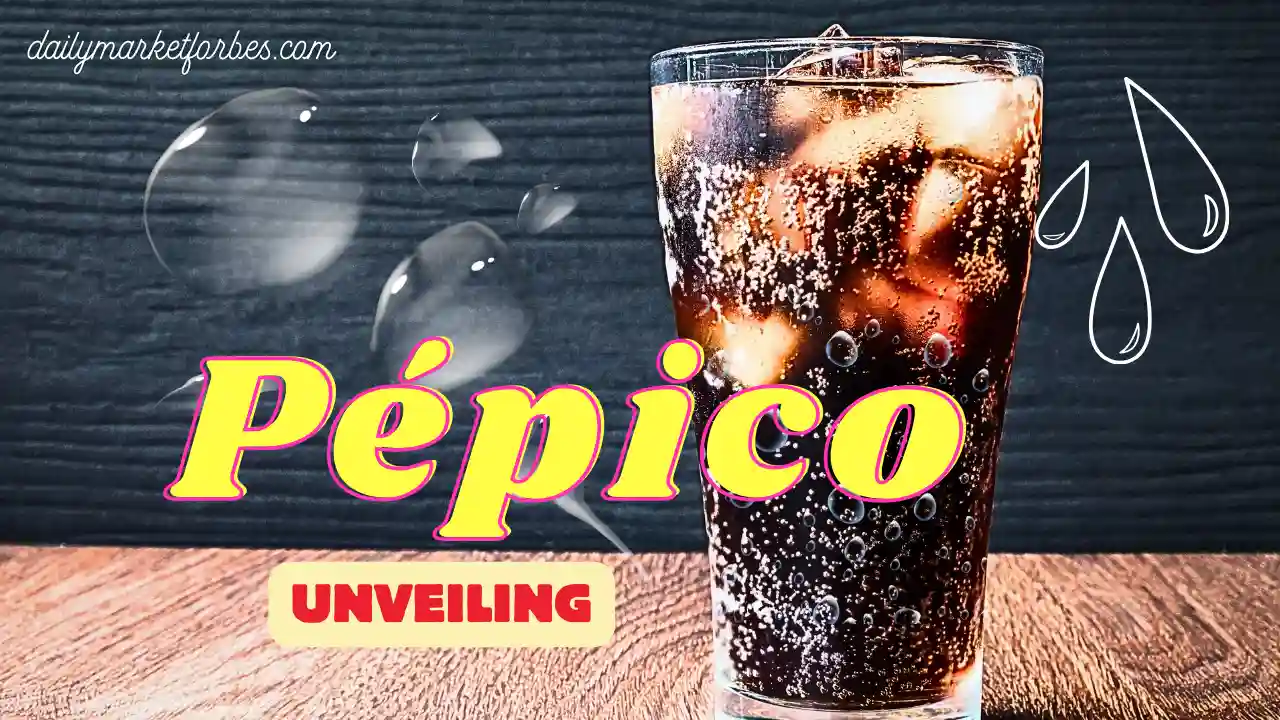Introduction of Pépico
Pépico: Revealing PepsiCo’s Worldwide Legacy, a name synonymous with iconic beverages and snacks, has left an indelible mark on the global stage. From humble beginnings to becoming a global powerhouse, PepsiCo’s journey is a testament to innovation, resilience, and the ability to adapt to an ever-changing market. But what makes PepsiCo stand out among its peers? Why has it managed to build such a lasting legacy? In this article, we’ll explore the history, impact, and future of PepsiCo, unveiling the secrets behind its global success.
The Origins of PepsiCo
PepsiCo’s story began with the creation of Pepsi-Cola in the late 19th century. Originally formulated by pharmacist Caleb Bradham in 1893, Pepsi-Cola was intended to be a refreshing drink that could aid digestion. The beverage quickly gained popularity, leading Bradham to trademark the name in 1898. However, it wasn’t until the mid-20th century that PepsiCo, as we know it today, was formed.
The pivotal moment came in 1965 when Pepsi-Cola merged with Frito-Lay, creating a pépico pizza menu. This merger marked the beginning of a new era, as the company expanded its portfolio beyond beverages to include snacks. The early years were not without challenges, but PepsiCo’s ability to innovate and adapt helped it navigate the competitive landscape.

PepsiCo’s Product Portfolio
One of the key factors behind PepsiCo’s success is its diverse product portfolio. The company boasts a wide range of brands that cater to various consumer tastes and preferences. From the refreshing taste of Pepsi and Mountain Dew to the savory crunch of Lay’s and Doritos, PepsiCo’s products have become household names worldwide.
In addition to its flagship brands, PepsiCo has consistently introduced new products to meet evolving consumer demands. Whether it’s healthier snack options, new flavors, or limited-edition releases, PepsiCo continues to innovate, ensuring that its products remain relevant and appealing to consumers across the globe.
PepsiCo’s Global Expansion
PepsiCo’s journey to becoming a global leader in the food and beverage industry has been marked by strategic expansion and acquisitions. The company’s global footprint began to take shape in the mid-20th century as it sought to enter new markets and diversify its offerings.
Throughout the decades, Pépico suntory has acquired numerous companies, including Tropicana, Quaker Oats, and Gatorade, each of which has strengthened its position in the market. These acquisitions have not only expanded PepsiCo’s product range but also its reach, allowing the company to establish a presence in over 200 countries.
Emerging markets have been a particular focus for PepsiCo, as the company recognizes the growth potential in regions such as Asia, Africa, and Latin America. By tailoring its products to local tastes and investing in infrastructure, PepsiCo has successfully tapped into these markets, further solidifying its global legacy.
PepsiCo’s Impact on Popular Culture
PepsiCo’s influence extends beyond the grocery store shelves; it has also made a significant impact on popular culture. Through savvy advertising and branding, PepsiCo has created some of the most memorable marketing campaigns in history.
From the iconic “Pepsi Generation” campaign to the celebrity endorsements by stars like Michael Jackson and Beyoncé, PepsiCo has always been at the forefront of pop culture. These campaigns have not only boosted brand recognition but also connected PepsiCo with consumers on an emotional level, turning its products into symbols of youth, fun, and refreshment.

Sustainability and Corporate Responsibility
In recent years, PepsiCo has made significant strides in sustainability and corporate responsibility. The company has set ambitious goals to reduce its environmental impact, focusing on areas such as water conservation, waste reduction, and sustainable sourcing.
PepsiCo’s “Pep+ (PepsiCo Positive)” strategy outlines its commitment to creating a positive impact on the planet and people. This includes efforts to reduce greenhouse gas emissions, improve agricultural practices, and promote recycling. PepsiCo is also dedicated to improving the nutritional profile of its products, offering healthier options to meet the growing demand for better-for-you snacks and beverages.
PepsiCo’s Role in the Food and Beverage Industry
As a leader in the global food and beverage industry, PepsiCo has played a significant role in shaping consumer trends. The company has consistently stayed ahead of the curve by anticipating and responding to changes in consumer preferences.
With the rise of health and wellness trends, PepsiCo has adapted its product offerings to include more nutritious options. This includes the introduction of lower-calorie beverages, reduced-fat snacks, and products with no artificial ingredients. PepsiCo’s ability to evolve with consumer demands has been crucial in maintaining its competitive edge.
Innovation and Technology at PepsiCo
Innovation is at the heart of PepsiCo’s success. The company has embraced technology to enhance its operations, from product development to marketing. PepsiCo’s R&D teams work tirelessly to create new products and improve existing ones, ensuring that the company remains at the forefront of the industry.
Digital transformation has also been a key focus for PepsiCo, with investments in e-commerce, data analytics, and automation. These advancements have allowed cty Pépico to better understand consumer behavior, optimize supply chains, and create more personalized marketing campaigns.
Challenges and Controversies
Like any global corporation, PepsiCo has faced its share of challenges and controversies. From legal battles to public relations crises, the company has had to navigate difficult situations while maintaining its reputation.
One of the major challenges for PepsiCo has been addressing concerns related to the health impacts of its products. Critics have pointed to the high sugar content in its beverages and the calorie density of its snacks. In response, PepsiCo has made efforts to reformulate its products and offer healthier alternatives.
Controversies, such as the backlash over certain advertising campaigns, have also tested PepsiCo’s resilience. However, the company’s ability to learn from these setbacks and take corrective action has helped it maintain consumer trust and continue its growth trajectory.
PepsiCo’s Vision for the Future
Looking ahead, PepsiCo has set ambitious goals for the future. The company aims to continue expanding its product portfolio, entering new markets, and driving sustainable growth. PepsiCo’s focus on innovation and technology will play a crucial role in achieving these objectives.
In addition, PepsiCo is committed to making a positive impact on the world. This includes not only environmental sustainability but also social responsibility. By investing in communities, promoting diversity and inclusion, and supporting initiatives that improve global health, PepsiCo aims to leave a lasting legacy that goes beyond its products.
PepsiCo’s Influence on Global Economies
PepsiCo’s influence is not limited to the food and beverage industry; it also plays a significant role in global economies. The company employs hundreds of thousands of people worldwide, contributing to the economic development of the regions in which it operates.
PepsiCo’s presence in emerging markets has had a particularly profound impact, as it creates jobs, supports local businesses, and stimulates economic growth. However, with this influence comes responsibility, and pizza Pépico is committed to conducting its business in a way that benefits both the company and the communities it serves.
PepsiCo’s Brand Loyalty and Consumer Engagement
Building brand loyalty has been a cornerstone of PepsiCo’s strategy. The company has invested heavily in understanding its consumers and creating products and experiences that resonate with them. This has been achieved through targeted marketing, innovation, and a focus on quality.
In today’s digital age, PepsiCo has also embraced social media and other digital platforms to engage with consumers in real time. This direct communication allows the company to build stronger relationships with its customers, gather feedback, and stay relevant in a fast-paced market.
PepsiCo’s Community Engagement and Philanthropy
Beyond its commercial success, PepsiCo has made a significant impact through its philanthropic efforts. The PepsiCo Foundation, the company’s charitable arm, has been instrumental in supporting communities around the world. From disaster relief to educational programs, the foundation’s initiatives have touched countless lives.
One notable example is PepsiCo’s commitment to providing access to clean water in underserved regions. Through partnerships with NGOs and local communities, PepsiCo has helped millions of people gain access to safe drinking water, improving health and livelihoods.
Comparing PepsiCo with Competitors
PepsiCo’s rivalry with Coca-Cola is one of the most well-known in the business world. Both companies have been in fierce competition for market share in the beverage industry for decades. However, PepsiCo’s diverse product portfolio, which includes snacks and food items, gives it an edge in certain markets.
While Coca-Cola remains a dominant player in the beverage sector, PepsiCo’s ability to diversify and innovate has allowed it to carve out a unique position in the industry. By continuing to expand its product offerings and adapt to changing consumer preferences, PepsiCo has maintained its status as a leader in the global food and beverage market.
Conclusion
PepsiCo’s journey from a small-town soda brand to a global powerhouse is nothing short of remarkable. The company’s ability to innovate, adapt, and connect with consumers has allowed it to build a legacy that spans over a century. As PepsiCo continues to grow and evolve, its impact on the world is likely to be felt for generations to come. Whether through its products, sustainability efforts, or community engagement, PepsiCo’s influence is undeniable.
FAQs
1. What are the key products of PepsiCo?
PepsiCo’s key products include beverages like Pepsi, Mountain Dew, and Tropicana, as well as snacks like Lay’s, Doritos, and Quaker Oats.
2. How does PepsiCo contribute to sustainability?
PepsiCo contributes to sustainability through initiatives like reducing greenhouse gas emissions, improving water conservation, and promoting recycling as part of its “Pep+ (PepsiCo Positive)” strategy.
3. What is PepsiCo’s global reach?
PepsiCo operates in over 200 countries, with a vast portfolio of products that cater to diverse consumer preferences around the world.
4. How does PepsiCo compare to its competitors?
PepsiCo distinguishes itself from competitors like Coca-Cola by offering a diverse range of products that include both beverages and snacks, allowing it to tap into multiple markets.
5. What is the future of PepsiCo?
The future of PepsiCo involves continued expansion into new markets, a focus on sustainability, and leveraging innovation and technology to stay ahead of consumer trends.







Be First to Comment